Top Tips for CPD
The winners of the 2019 CPD Awards have put together a series of top tips for continuing professional development. If you’re looking for inspiration for improving your approach to CPD, or want to enter our CPD Awards in future, read the tips below to find out what our winners have to say.
Amelia Lesiuk, RSci:
 Step outside our comfort zone. American author, Neale Donal Walsch said “Life begins at the end of your comfort zone. You won’t find glory at the centre of safety but at its ages […].You have to not only pick up the dice but roll them. So go ahead, take the gamble”. We need to be brave, overcome our fears and keep repeating ourselves “I can do it”.
Step outside our comfort zone. American author, Neale Donal Walsch said “Life begins at the end of your comfort zone. You won’t find glory at the centre of safety but at its ages […].You have to not only pick up the dice but roll them. So go ahead, take the gamble”. We need to be brave, overcome our fears and keep repeating ourselves “I can do it”.
Have a conversation with your line manager about how you feel in your role, whether you are struggling with something, you need to learn something new or improve existing skills. Our line managers help us to identify our skill gaps and advise on how to fulfill those gaps. Maybe you are interested in attending an events/workshop/conference? You can explain why you would like to attend it and what you and your organisation will benefit from it.
Locally source your CPD. Sometimes the training budget in the organisation can be limited but there might be many other training opportunities available to technical staff, which do not have a financial cost. At the University of Leeds, such courses are provided by OD&PL, Logic Centre, IT department, training at Faculty level – such as Unconscious Bias, or at University level – such as the Microsoft Teams training.
Build a technicians network in your organisation. We need to be proactive in sharing CPD opportunities with our colleagues and ask them to do the same for us. At the University of Leeds Technicians’ Network & Technicians’ Champions keeps us informed about various development opportunities for technicians.
Getting involved in an external organisation is very important for personal professional development as they might have relevant opportunities that are not available locally. The Science Council, IST, Technicians Make it Happen, STEM are the examples but there is much more.
Taking regular notes, feedback and reflection after each CPD training is a must-do thing and cannot be omitted. There is nothing more demotivating than doing all CPD training record close to a deadline in one go.
Janis MacCallum, CSciTeach:
Don’t save it all up to the week or month before the CPD record is due, and then spend a day and a half, looking back through your diary/notes etc., to reconstruct what you’ve done! However, DO keep a diary that allows you to know that what you are doing is CPD (maybe highlight in a different colour) so that you can identify for record-keeping purposes easily.
The things you do to develop don’t have to be HUGE things, just things that will help you (even in a very small way) to move things forward in some way, or to apply a new approach (slightly) to something that you do. If you do go to a big meeting/conference, don’t feel that you need to use EVERYTHING you heard about to change your approach. Little smatterings of new information here and there are just as successful, if fact often more so, than all new.
 Don’t be too picky – there’s lots of way to pick up new information/approaches so don’t be frightened to say YES to things that maybe don’t sound initially appealing. You never know what you might pick up or how your experience might change you.
Don’t be too picky – there’s lots of way to pick up new information/approaches so don’t be frightened to say YES to things that maybe don’t sound initially appealing. You never know what you might pick up or how your experience might change you.
Don’t feel you have to DO something just because everyone else has done/is doing it. If it doesn’t work for you or where your direction is taking you, you should have the right to turn it down.
Enjoy these chances to be creative, explore yourself and claw back a little time for your own development, as opposed to helping to develop everyone else. You DESERVE it!
Sarah Littler, CSci:
Don’t see CPD as a box-ticking exercise, see it as an active opportunity to build confidence, identify areas of growth and enhance your reputation.
Keep a log of activities and keep it up-to-date – an ongoing record will reduce the administrative burden of tracking CPD and will facilitate reflection and monitoring of your progress.
Recognise the multifaceted nature of CPD, it’s not only about technical knowledge, but wider skills (consultancy skills, communication, leadership, staff management, project management, application area knowledge, and so on).
 Reflect on the benefits of your CPD, not just to yourself (and your career growth/opportunities) but to your company, colleagues, clients, the wider statistical community, the public, etc. This is what makes CPD worthwhile and makes it rewarding.
Reflect on the benefits of your CPD, not just to yourself (and your career growth/opportunities) but to your company, colleagues, clients, the wider statistical community, the public, etc. This is what makes CPD worthwhile and makes it rewarding.
Feeling inspired? Find out more about professional registration here.
